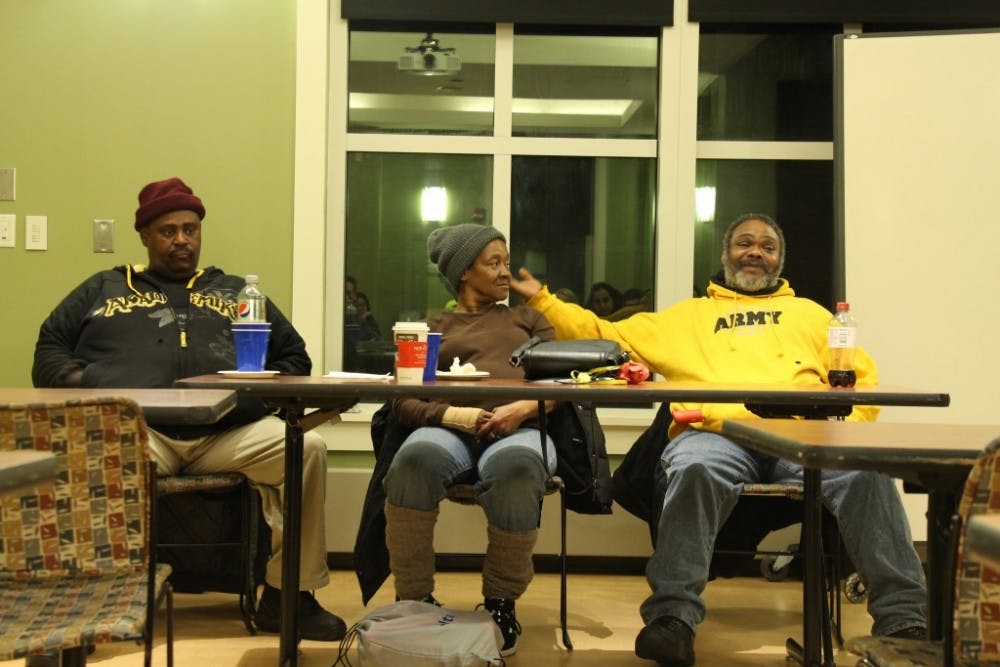Hopkins for the Homeless hosted a panel on Tuesday in Charles Commons featuring several Baltimore residents who have experienced homelessness.
James Barnes, George Marsh and Michele Williams, from the advocacy group Faces of Homelessness, spoke at length about their personal difficulties. All three are members of the organization’s Speakers’ Bureau, which seeks to connect those with homes with those who have faced homelessness.
Barnes described how his path to homelessness began after spending 20 years in prison. After release, the state gave him $50 and a 30-day supply of diabetes medication. He had no one to contact for help except for a relative, whom he was allowed to stay with for two weeks. Barnes knew he needed to find a permanent place of residence.
“Here I was, an ex-felon,” Barnes said. “I needed a job. I needed medication. How can I establish all of that in two weeks?”
Barnes was unable to find a job and place to live in two weeks and ended up back in prison on a parole violation. After being released again, he took refuge at various homeless shelters but was kicked out frequently for inciting fights. In 2015, Barnes got in touch with social services and was placed into a program that provided him with housing. He stated that he is working on anger management and is in a better place.
“I want to do everything I need to do to get where I want to go,” Barnes said. “These programs help me and show me that in order to succeed, I’ve got to help myself. I’ve got to set goals. I’m not going to stop ’til I’ve achieved my goals.”
George Marsh also faced trouble with the law prior to becoming homeless. He abused drugs and alcohol and burned dumpsters, which landed him in prison. Over many years, Marsh had to give up his house and car and continued to go in and out of prison. He did not even realize that he was homeless until one day he had no possessions and no place to live.
His final prison sentence was supposed to last 40 years. However, in prison Marsh began re-educating himself. Because of his commitment to his studies, Marsh obtained his GED and started taking classes at Coppin State University upon release.
“Education is key to power,” Marsh said. “Power is key to understanding and unlocking your mind. I have learned that I can help other people. I can educate them and lift them up.”
Michele Williams recounted the many abusive relationships that led to her isolation and homelessness. Williams married and had children at a young age, obtained her GED and graduated from Morgan State University. Unable to stay with her abusive husband, Williams left Maryland and moved to Connecticut with a new husband.
Her second husband turned out to be equally as violent. After being beaten with a baseball bat and left for dead, Williams escaped and returned to Baltimore. She became addicted to drugs but found a solid job through a man who she thought was a good match and a kind person. However, he ended up almost killing Williams out of jealous rage.
“It was my grandson’s birthday. The man comes and knocks on the door and asks me to come into the hall to talk to me. I went out there but didn’t think, ‘Why does this man have a trench coat on when it’s warm outside?’ I’d come to find he had a carving knife hidden in the sleeve,” Williams said. “He said, ‘Wow, [how] come you don’t want to be with me?’ I said, ‘What are you talking about? I’m getting ready for a birthday. Come talk to me later.’ When I went to go back inside, he stabbed me.”
Williams awoke from a coma with 177 stitches. She fled Maryland because she was afraid that the man’s family would come after her. She went to Tennessee and Georgia, abused drugs again and served two years in prison. Williams later returned to Maryland and began living in shelters. She described the horrors of shelter life: thieves, rats and bugs everywhere. After months, Williams was able to secure a permanent place of residence.
“I finally got my place, and I’ve been staying there,” Williams said. “Now I do advocacy for homeless people. I try to help them get into housing and find shelters.”
Sophomore Natalie Crow, who serves as the secretary of Hopkins for the Homeless, appreciated the sincerity of the speakers’ testimonies.
“To hear their accounts firsthand of what they’ve gone through and to put a face on homelessness helps the issue of homelessness resonate with people,” Crow said. “It’s a kind of transformative experience to see what they’ve gone through and what they’ve overcome. I hope that people learn that you can overcome [homelessness] and how pervasive it is in our society.”
Vice President of Hopkins for the Homeless Grace Baek explained the purpose of the panel.
“One of the goals of our organization is to show people what homelessness is actually about and take away the stigma of homelessness,” Baek said. “This was one of the big events of the semester to raise awareness.”
Students, like freshman Bryan Li, reacted positively to the speakers’ panel. He said that he learned more about what it means to be homeless.
“From these accounts, I learned that sometimes homelessness is a phenomenon that’s not the result of a person’s actions but the circumstances that they were presented with,” Li wrote in an email to The News-Letter. “Homelessness also stems not only from lacking shelter but the ability to rely on others for help and support in times of need. I had some idea of what it might be like to be homeless but the panel opened up my eyes to the severity of events that plague people’s lives to force them into homelessness.”





